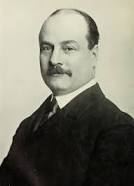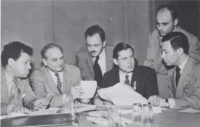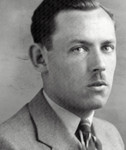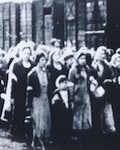As president of Columbia University in the 1930s, Dr. Nicholas Murray Butler (1862-1947) sought to build friendly relations with Nazi Germany.
In December 1933, Butler invited the Nazi German ambassador to the United States, Hans Luther, to speak on campus. Butler also hosted a reception for the ambassador. When students protested, Butler insisted that Luther represented “the government of a friendly people” and therefore was “entitled to be received…with the greatest courtesy and respect.” Ambassador Luther’s speech focused on what he characterized as Hitler’s “peaceful intentions.”
Butler also cultivated friendly relations with Nazi-controlled German universities. While Williams College terminated its program of student exchanges with Nazi Germany, Columbia and other universities declined to do likewise. Even the blunt statement by a German official that his country’s students were being sent abroad to serve as “political soldiers of the Reich” did not persuade Butler to pull out of the exchange program.
In 1936, the Columbia administration announced it would send a delegate to Germany to take part in the 550th anniversary celebration of the University of Heidelberg, despite the fact that Heidelberg already had been purged of Jewish faculty members, instituted a Nazi curriculum, and hosted a burning of books by Jewish authors. “Academic relationships have no political implications,” President Butler insisted.
Butler joined with the presidents of Harvard and Yale to plan how to deflect criticism of their decisions to send university representatives to Heidelberg. Columbia’s representative, Professor Arthur Remy, pronounced the reception at which Josef Goebbels presided “very enjoyable.”
The Columbia student newspaper, The Spectator, denounced Butler’s decision to send a delegate to Heidelberg, and students held a “Mock Heidelberg Festival” on campus, complete with a bonfire and mock book burning. “Butler Diddles While the Books Burn,” some of their posters proclaimed.
The students also staged a protest rally in front of Butler’s mansion. Butler accused a leader of the rally, Robert Burke, of having “delivered a speech in which he referred to the President [Butler] disrespectfully.” Even though Burke had excellent grades, and even though Columbia’s own attorney later acknowledged that “the evidence that Burke himself used bad language is slight,” Burke was permanently expelled from Columbia.
Arthur Garfield Hays, a pre-eminent civil liberties attorney, represented Burke when he unsuccessfully filed suit to gain readmission. In the late 1930s, Butler changed his position and spoke out against the Nazis.
However, he never readmitted Robert Burke to the university.
Sources: Norwood, The Third Reich in the Ivory Tower, pp.93-102.











